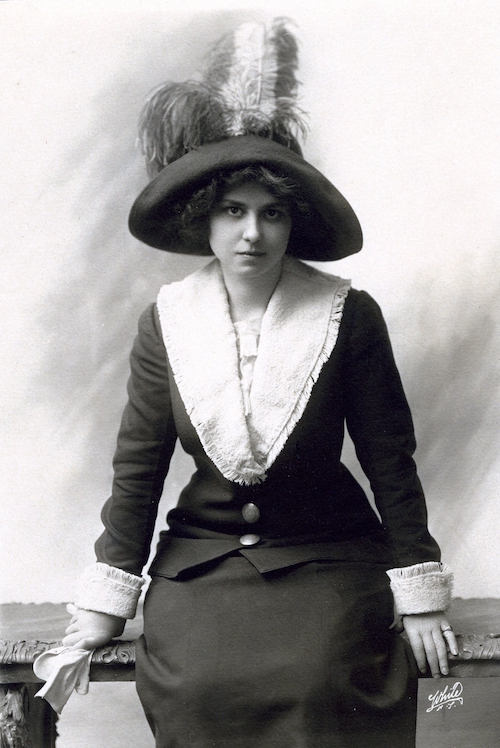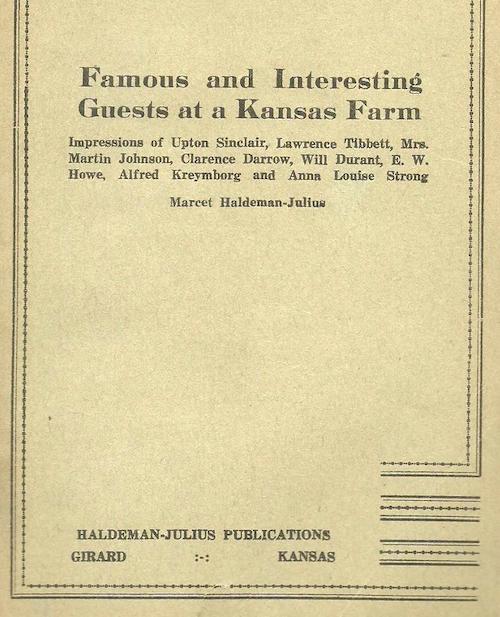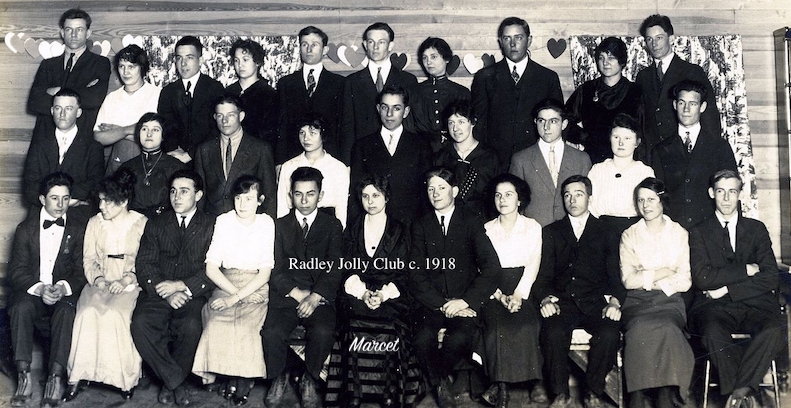
History's Hidden Gems
More News Articles
by Holly Swigart

Marcet
by Holly Swigart November 12, 2021
Everyone in town knew the Haldeman family. Their big two story house was a prominent feature in Girard, Kansas, in the early 1900s. Citizens of Girard knew Dr. Haldeman as a physician and owner of the local bank. His wife, Alice Haldeman assisted her husband in surgery, and later became the first female bank president in Kansas. The Haldeman's little girl, their only child, Anna Marcet, looked like a princess. She certainly dressed the part and she had a pony!
Marcet was beautiful and talented and rich and had always wanted to be a stage actress. After receiving her education at prestigious schools back East, Marcet chased her dreams all the way to New York City in order to pursue an acting career. For about five years, she performed on stage as an actress in New York and worked with Cecil B. DeMille.
Marcet's days on the big stage came to an end when she received word that her mother was gravely ill. She gave up her brief, but exciting career as an actress and returned home to Girard where she took on her mother's duties as head of the State Bank. She went from living the lifestyle of a performing artist in the nation's largest city to a life in the small town of Girard, Kansas, performing the duties of a business woman in charge of running a bank.
Marcet Haldeman may have been born into a life of privilege, but she grew into a young woman with a social conscience who strove to improve the lives of those less fortunate. As she settled into life back in her home town of Girard, Marcet couldn't help but notice the living conditions in the local coal camps. When she passed by the small, dreary mining shacks, she was genuinely moved by the faces of the children she saw there. Marcet made up her mind to do something for those kids. She located a building in nearby Radley and bought enough acreage around it to have room for playgrounds and ball fields. Here Marcet established The Radley Jolly Club for the local youth. She didn't just throw money at the problem, but instead took a hands on approach. She worked with the young girls to sew curtains, while the boys pitched in to develop the outdoor playground areas. She collected books and magazines for the Jolly Club and organized events with music and dancing. Since most of the Jolly Club members spoke Italian, Marcet decided to learn Italian, too. Marcet truly enjoyed her work with the Jolly Club and the young people loved her for it.
Meanwhile, on the other side of town, The Appeal to Reason was enjoying tremendous success as the nation's largest Socialist Newspaper. The newest member on staff was one Emanuel Julius who had recently arrived from New York to join the team. When Marcet Haldeman and Emanuel Julius met, sparks began to fly. After only a few months, they decided to marry. The newlyweds took the unusual step, in 1916, of adopting each other's last name, and they became the Haldeman-Julius couple. With idealistic dreams spurring them on, and Marcet's money to back their efforts, the couple purchased the Appeal to Reason newspaper.
The newly formed Haldeman-Julius publishing company devised a plan to publish little pocket sized books offering great works of literature as well as 'how to' books on subjects of interest to both women and men. Their mission was to get books into as many hands as possible by making them affordable to everyone. John Gunn, assistant editor at the Appeal and a close friend of Emanuel, worked with them in their new endeavor. John's background in printing, as well as his enthusiasm for the project, and his talent as a writer and journalist made him a valuable asset. John's father, Benjamin Gunn, had been selling his own little pocket sized books for about six years and was making a comfortable living at it. Benjamin Gunn was successful because he loved to travel and enjoyed being a salesman. The Haldeman-Julius publishing company didn't need a traveling salesman, however. Their secret weapon was their mailing list of over half a million subscribers to the Appeal to Reason. These young idealistic friends, Emanuel, Marcet, and John were all in their twenties and were all writers. Each of them authored a number of the early "Little Blue Books." Soon their Little Blue Book mail order business took flight and sales of Little Blue Books eventually soared into the hundreds of millions.
Publishing Little Blue Books brought Marcet into contact with a variety of famous people, including Jack London, Upton Sinclair, Clarence Darrow, and Mrs. Osa Johnson, to name only a few. In her book, "Famous and Interesting Guests at a Kansas Farm," she shares stories about some of these friendships, and tells about attending the Scopes Monkey Trial in Tennessee in 1925. She also describes her visit to the Soviet Union in 1931 where she managed to talk the Russians into paying what was owed to the Haldeman-Julius publishing company. Marcet was brave, adventurous, and a very astute observer of human nature.
Marcet's many accomplishments in addition to being a loving mother, running a working farm, and serving as president of a bank, also included writing a variety of books, plays, and news articles. She traveled the country and the world as a journalist, but she didn't just write about making the world a better place. She walked the walk and found creative ways to be a positive influence in her own home town of Girard.
John Gunn wrote a beautiful remembrance of Marcet which was read at her funeral in 1941, and was later published as a small booklet simply titled, "Marcet." In it he writes that there is one quality which outshines all the rest when describing Marcet, and that is love. "Marcet loved children, and dogs, and horses; she loved the birds and flowers; she loved books and poetry and ideas - - and she loved the moonlight. If one could imagine Marcet having a spirit that might dwell without limitation on some other sphere, one would see her dear face and her gay, sweet, understanding smile on the bright, fleecy sward of the moon when at its zenith it is most silvery-pure."
